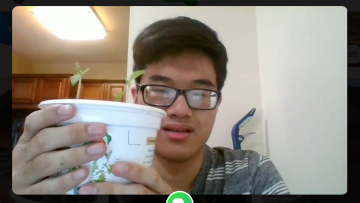Colonial Middle School eighth graders plant tomato seeds that have been to space

CMS Eighth Grader Gwon-Woo Kim shared his results in a video through an app called Flipgrid.
Eighth Graders at Colonial Middle School (CMS) had the opportunity to participate in the Tomatosphere project, where they planted two different sets of tomato plant seeds — one set that spent time in the International Space Station and another that stayed on Earth.
“We want to know how things like zero gravity affect the seeds, because moving forward, there will be missions where we will be sending humans to Mars and far off places, and they’ll need a source of food,” said CMS Science Teacher Katie Przasnyski.
Originally, the project was slated to be a classroom activity, where the students would perform the experiment together. Luckily, Mrs. Przasnyski took the seeds home at the beginning of the quarantine. Eighth graders in their homes were still able to volunteer for the program as a science enrichment activity.
The requirements for the Tomatosphere project included: a container to plant the seeds, soil to grow the seeds, water, sunlight and patience. Mrs. Przasnyzki was able to mail the seeds, as well as containers and soil if needed, to the volunteers.
The eighth grade scientists planted three seeds marked “L” and three seeds marked “M.” The students were looking for the seeds to grow and “germinate,” which, for the experiment, was characterized by when the new plants had two distinct leaves. They reported back their results in videos through Flipgrid.
“In my L tomatoes, I have two little sprouts, and they appear to have two little leaves growing off of the sides. So they’re very small, but they’re growing,” said Grace Lendacky. “And then on my M tomatoes, I have nothing that has properly germinated.”
The eighth graders planted 57 of each group and ended up with 22 “space tomato” plants (M) and 28 “Earth tomato” plants (L). Mrs. Przasnyzki will share the results with the First the Seed Foundation who runs the project. The Foundation notes that tomatoes would be valuable plants for space applications, because they provide wholesome nourishment, as well as purified water through evaporation from their leaves.

